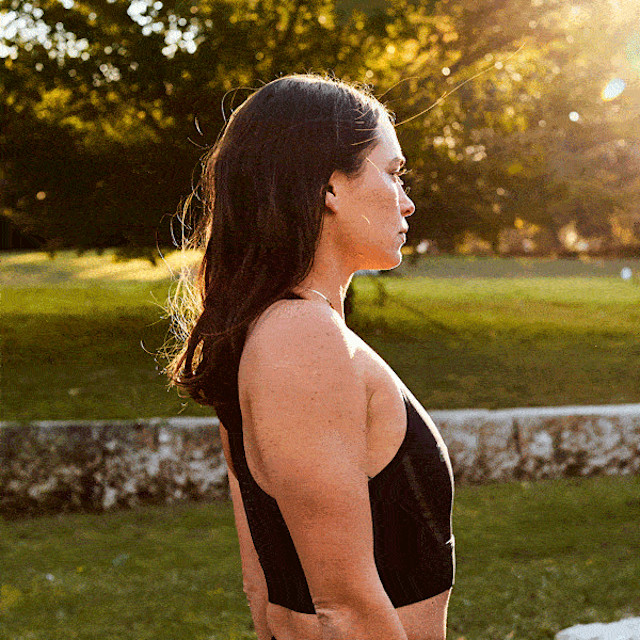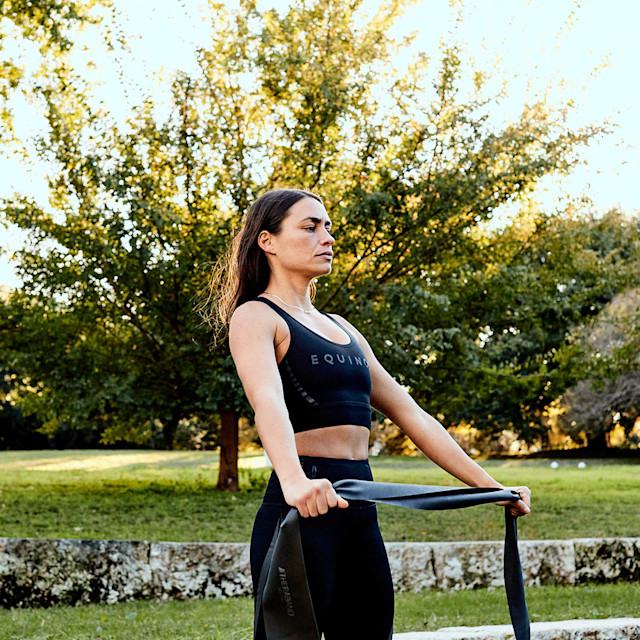Each one has deep physical and mental effects.
In the context of fitness, opening your heart is more than just an expression.
"Everything you do regularly—like driving, using your phone, working at a desk, and bending over to lift your kids up—rounds your back and shoulders inwards," says Jaime Rauso, group fitness instructor and stretch therapist at Equinox Austin in Texas.
Heart-opening stretches reverse that movement pattern and relieve the back, chest, core, and shoulder tension that can cause pain and injury, says TK Murray, manager and master therapist at The Spa at Equinox Sports Club New York. Releasing that upper-body stress can positively affect the lower body, helping you run faster, longer, and with less fatigue or strain, he notes.
Beyond physical benefits, there is a very clear mental advantage to be gained from these stretches. “Many people hold emotions such as fear and anger in their chest, abdomen, or shoulders,” says Murray. “Chest stretches increase oxygen intake and correct posture, both of which decrease anxiety."
Adds Rauso: "They give you the opportunity to connect on a deeper level with your surroundings as they literally open your heart towards the sun and other people."
Here, Rauso demonstrates five stretches that are loved by Equinox’s top bodyworkers. She suggests performing any number of them before work, during lunch, and when you get home in the evening. "You can never go wrong resetting your posture and opening your heart."

Thoracic spine support
How: Lie faceup on a mat with a rolled up towel or foam roller under and parallel to your thoracic spine. Rest your arms by your side or out wide. Hold for 40 seconds to 2 minutes.
Why: When someone is stressed or grieving, their shoulders might be rounded to protect the heart, says Loren Tazalla, a massage therapist at The Loop in Chicago. “This simple stretch opens up the chest and helps your shoulders melt to the ground.”

Glute bridge
How: Lie faceup on a mat with your knees bent and feet planted at hip-width. Engage your core and glutes and exhale as you lift your hips. Hold, then inhale and lower to start for one rep. Complete 1 set of 10 reps with 3-second holds and 1 set of 10 reps with 5-second holds.
Why: “This will release tension in the psoas muscles and the obliques,” says Murray.

Band pullover
How: Stand tall with a neutral spine and pelvis, feet at hip-width, and arms extended down and out, holding a resistance band taut with both hands. Slowly lift your arms to bring the band over your head, then lower your arms behind you to bring the band as close to the small of your back as you comfortably can. Reverse the motion to return to start for one rep. Perform 5 reps with this wide grip, then 10 reps with your hands closer together once your shoulders are warmed up.
Why: This move opens the chest and builds shoulder mobility, Rauso says, both of which are important for mood-boosting posture.

Scapula boxes
How: Stand tall with arms by your sides, your right hand in a fist, and feet at hip-width. Keeping your left arm straight, elevate, protract, depress, and retract your left shoulder for one rep. (Imagine you're drawing a square with your shoulder.) There should be no influence of any musculature besides those involved in moving the shoulder. Complete 5 reps in each direction, then switch arms and repeat.
Why: Scapula boxes improve the mind-body connection as well as range of motion in the shoulder joint. "This is a good way to train your neuromuscular control to only access the muscles you are intending to activate," Rauso says.

QL rotation stretch
How: Lie faceup on a mat with your knees bent, arms by your sides, and feet planted next to each other. Without lifting your shoulder blades, squeeze your knees together and slowly lower them to the left to stretch the right quadratus lumborum (QL) in your low back. Hold for 20 to 30 seconds, then return to start for one rep. Complete 3 reps, then switch sides and repeat.
Why: Rounding your body forward can negatively affect your mood. This stretch relieves the lower-back tension responsible for that tendency, says Murray. “When you're relaxed, you’re more open to receiving positive things in your life.”
Photography by Mohamed Sadek
